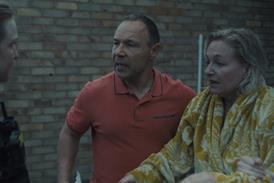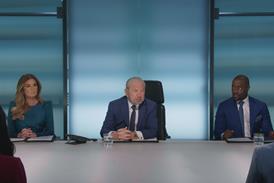“The film presented a bleak vision of the industrialisation of comedy.” Read on for the verdict on last night’s TV.
Funny Business, BBC2
“A new documentary series about the comedy industry, Funny Business…began a wonderful new practice that I hope will catch on. Its comedian interviewees were captioned up with what they were worth on the corporate after-dinner circuit. Clive Anderson could earn up to £25,000 for 20 minutes, Arthur Smith between £5,000 and £10,000 and Barry Cryer a bargain £2,000 to £5,000…The film presented a bleak vision of the industrialisation of comedy with Jeremy Lee strutting around an office encouraging his team of bookers to match client with comedien, the latter granted the honorific “the lovely” as in “the lovely Hugh Dennis.”
Andrew Billen, The Times
“It’s a kind of high-end prostitution without the sex,” said Jo Brand, one of those who is actually prepared to whore out her talent for the corporate client. That’s a prejudicial way of putting it, of course, and much of the tension in Funny Business, between comics who do and comics who don’t, arose from the ambiguous status of the stand-up comedian, who occupies a position somewhere on a spectrum running from end-of-pier entertainer to priestly social commentator.”
Tom Sutcliffe, The Independent
“In Funny Business, the first of a series, Eddie Mair narrated an investigation into the ways in which standup comedians can make big money, none of which is by telling jokes in comedy clubs…Appearing in adverts is one way, but many comics find selling stuff on TV to be inconsistent with either their morals of their sense of humour…A lot of comedians won’t touch corporate gigs either…Jo Brand finds them bracing – “If you do corporates, you get the message that not everyone loves you,” she says-but Rhod Gilbert still gets heart palpitations just driving past the venues of old corporate failures. It may be filthy lucre, but it doesn’t sound like easy money.”
Tim Dowling, The Guardian
Growing Up Poor, BBC 3
“The nonsense of dividing Britain up into strivers and slackers was the unstated theme of the second part of Growing Up Poor, which turned its attention to “lads”. Dave Foulkes’ excellent, unflinching film picked on three young men in their late teens who strove to get anywhere, slow or fast…Wes’s story pointed to the irony in the programme’s title. Hanging about with younger kids on street corners, sofa-surfing, sporting SpongeBob socks, Wesley, as his girlfriend knew, wasn’t growing up at all. You need a job to do that.”
Andrew Billen, The Times
“On the face of it, the three young men in Growing Up Poor were perfect casting for that Tory ad campaign that set out to whip up public resentment about an underserving underclass, the skivers rather than the strivers…As Foulkes’s narrative noted, we’re all in it together. But some of us are in it deeper than others.”
Tom Sutcliffe, The Independent
Saving Face: True Stories, C4
“Zakia, 39, could no longer tolerate living with her abusive husband, a drunk and drug addict…Her husband, in response, threw acid in her face…The miraculous reconstruction of Zakia’s face-part skin-graft, part prosthesis – takes place over many months, and coincides with the trial of her husband Pervez for the attack…Not only did Rukhsana’s husband throw acid at her, her sister-in-law poured petrol over her, leaving her mother-in-law to set her on fire… Amazingly, both Pervez and Rukhsana’s husband Yasir agreed to speak on camera. They were remarkably unrepentant, insisting – in both cases preposterously – on their innocence.”
Tim Dowling, The Guardian
Spies of Warsaw, BBC4
“Some stories are destined to be abandoned at the halfway point. Others are grieved over by their audiences who feel about the ending much as they’d feel about parting from a dear friend. I felt that way about Spies of Warsaw even though it was inevitable that a story set in pre-war Poland was going to wind up with a certain series of events.”
Matt Baylis, Daily Express





























No comments yet